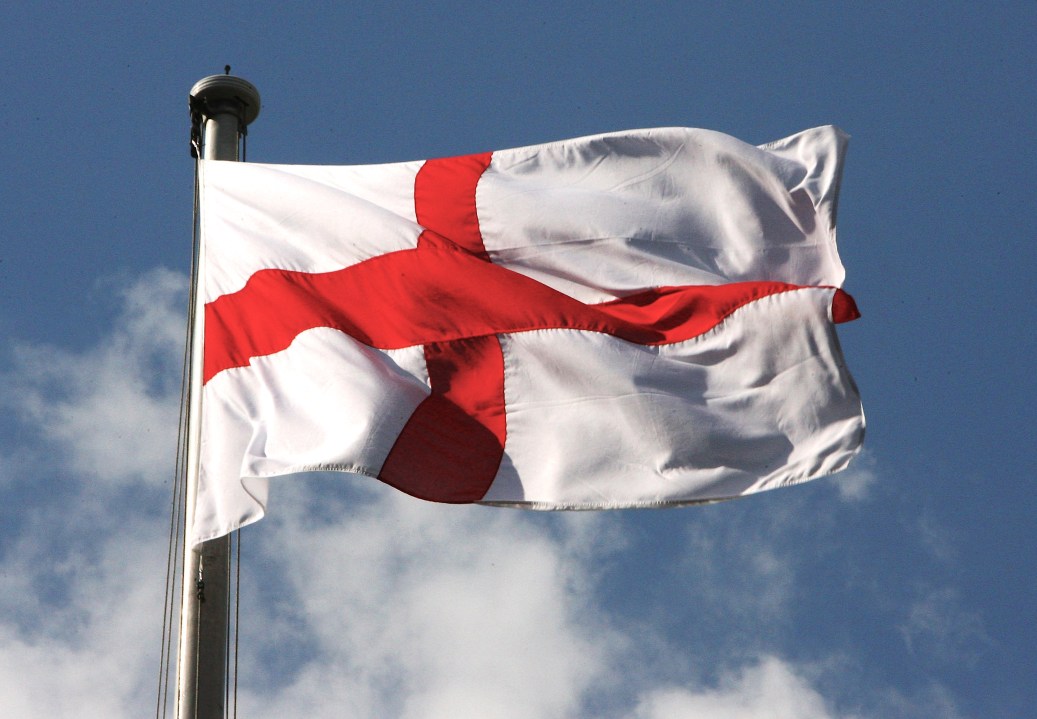Flags have become a contentious and defining issue of this year. You only have to witness the furore that has surrounded the increasing proliferation of the Progress Pride and Palestinian flags in this country to recognise this. So it was only a matter of time before that other increasingly common sight, flags denoting pride in Englishness and Britishness, should have been drawn into the fray.
As reported in the Daily Telegraph this morning, Birmingham Council has ordered the removal of Union and St George’s flags from lamp posts. In response to initiatives made by residents in the fortnight approaching VJ Day to install hundreds of the flags in the predominantly white British suburbs in the south-west of city, on Tuesday the Labour-run council announced plans to remove them, claiming that they put the lives of pedestrians and motorists ‘at risk’.
This has legitimately aroused accusations of double standards. Critics have pointed out that Palestinian flags have flown within impunity elsewhere on the city’s streets since the war in Gaza began in 2023. ‘This is nothing short of a disgrace and shows utter contempt for the British people,’ Lee Anderson, the Reform MP, has said. Robert Alden, leader of the authority’s Conservative opposition, has added: ‘Our national flags are nothing to be ashamed of. Labour rushing to rip them down is shameful.’
Yet, while showing eagerness to double-down on expressions of Englishness and Britishness, this week Birmingham council has been simultaneously celebrating the heritage of its sub-continent ethnic minorities. Last night it lit up the main library in the colours of orange, green and white to mark 79 years of India’s independence, hours after showing the same courtesy to Pakistan.
It was perhaps inevitable that on GB News last night the council was charged with a ‘two-tier’ approach to community relations. It’s not an unreasonable accusation, given that this approach has been an increasingly common one taken by a Labour government and judiciary desperate to placate inter-communal tensions.
It’s difficult to escape the conclusion that that council is indulging in another form of asymmetrical multiculturalism. In other words, yet again we’re seeing an arm of the state rejoicing in the cultures of minorities but being decidedly less forthright in celebrating the culture of this country’s majority.
The council’s protestations that such flags pose a risk to safety will strike many as dubious, given that many of these flags are up to 25ft off the ground. This excuse is doubly unconvincing given that, beginning in August 2020 in Birmingham’s gay village, rainbow-coloured street crossings in the style of the Pride Progress flag have been installed in the city. Yet these have been known to pose a threat to the blind and partially-sighted, as well as being confusing for police horses.
The left has always been known to shirk from symbols of patriotism out of embarrassment and guilt, so the decision by the Labour-run body is true to form. But the council’s proactive policy on representation of ethnic minorities has also taken place against a backdrop of the ascendency of sectarian politics in Britain. Labour is desperate to shore up its dwindling support among British Muslims, many of whom have been alienated by its less than outspoken stance on Gaza, and a minority of whom seem to show little loyalty or affection for this country at all. Labour is also mindful of the threat posed by the yet-to-be named splinter faction led by Jeremy Corbyn, a party that will cater for alienated ethnic minorities, the far-left and an idealistic graduate class.
Birmingham’s decision has taken place at a time British society is seemingly falling-apart at the seams
Most importantly, Birmingham’s decision has taken place at a time British society is seemingly falling-apart at the seams, appearing to teeter on the point of outright disorder. In June, David Betz, Professor of War in the Modern World in the Department of War Studies at Kings College, warned that British cities were at risk of becoming ‘feral’ and could even descend into civil war in the next few years. This type of rhetoric is becoming increasingly common. In April, the Daily Telegraph’s Tim Stanley issued the similarly foreboding words: ‘I now fear Britain is heading for open sectarian conflict, possibly war, and there’s nothing we can do to stop it.’
Both the emergence and profusion of flags which are proxy indicators for tribal membership and sectarian affiliation – the Palestinian flag also serves as symbol of progressive internationalism for the liberal white middle-class – and moves to suppress them are indicative of the fractious nature of British society today.
No wonder a traditional left-wing attitude to the St George and Union flags is gradually shifting from shame and embarrassment towards fear, given that these icons are associated with growing indigenous resentment and restiveness, not to mention a surge in support for Reform at the polls. And that, ultimately, is what strikes terror into the hearts of the establishment today.








Comments